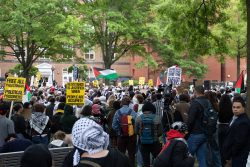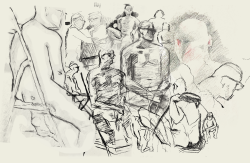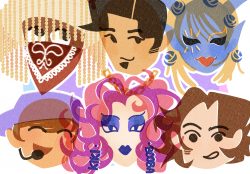It’s a little after 12:30 on a Tuesday night, and the palpable energy in the U Street Music Hall shows no sign of dissipating. DJs Tensnake and Brian Billion have already hyped up the crowd, and when Jesse Rose, an internationally acclaimed DJ from London, gets into the booth and begins his set, the sweaty mass of dancers grooves on, barely noticing the change.
Unless they witnessed the performers quietly switch places behind the dark booth or detected the subtle shift in the style of mixes, there is no way the partygoers would have noticed that the hands spinning the records had changed. None of the DJs announced their entrances, said their names, or addressed the crowd in any way—that would have interrupted the music.
At U Street Music Hall, which opened in March of this year, the music is always the center of attention. From its black, minimalist interior to the gut-shaking speaker system that rattles its floor, the venue has become a haven in D.C.’s expensive, VIP-oriented nightlife scene for those who are looking just to dance.
“I feel that [the music itself is] kind of an afterthought for a lot of venues around town,” U Hall co-owner and DJ Jesse Tittsworth said. “You can tell that we’ve definitely put a bulk of our money into the sound system, there’s a no-photography policy to encourage people to kind of live in the moment, stuff like that.”
In the past six months, U Hall’s focus on quality DJing and its unpretentious, no-frills atmosphere has helped start a revival, centered mainly in clubs along the U Street corridor, of dance-oriented parties in the District.
In the 1990s, a time widely regarded as the golden age of the D.C. dance scene, DJ-focused clubs with dedicated fans were the norm. A group of clubs in the Near Southeast area, like Capitol Ballroom and Tracks, thrived on gritty, inexpensive dance parties with what Tittsworth called a “come as you are and dance all night” attitude.
“There was this corridor of dingy, no-frills dance clubs and rock venues in the Southeast area,” he said. “[They] were just focused on having really good DJs, and a good sound system, and a good time.”
But over the past decade, new property developments in Near Southeast forced many clubs to shut down. By 2006, when the remaining clubs were steamrolled into the Nationals Stadium parking lot, the scene had shifted to the U Street corridor in Northeast, where bass-heavy grit and sweaty dancing were largely replaced by chintzy VIP booths and steep cover charges.
In the U Street area, originally known for its jazz and soul performers, live concert venues like the 9:30 Club and the Black Cat hosted dance parties as part of their regular rotations, but were more focused on their live music acts than on DJs.
While Tittworth was organizing and promoting events in the corridor with longtime colleague and friend Will Eastman, he said they saw the need for a dance-oriented venue in the District.
“When we first started doing events at the 9:30 Club together, [the audience] was a few hundred kids, and by the time we were done with it, it was like 700 to 800 kids,” Tittsworth said. “And it’s the 9:30 Club, there’s no sort of built-in crowd there.”
But before they established U Hall, some parties managed to keep going through the last decade, bouncing from venue to venue. Nouveau Riche, a combined effort by local DJs Gavin Holland, Andrew Nacey, and Steve Starks, started out in 2006 as a small party among friends with similar musical interests at U Street club DC9, but it has become one of the District’s most successful dance parties.
Much like Eastman and Tittsworth, the group wanted to revive the ideals of former D.C. performers who made music for the sake of music.
“Fugazi shows were famous for never costing more than five bucks no matter what,” Holland said, referring to D.C.’s famous 90’s punk group. “Even though their popularity might have demanded a higher ticket price for their shows, their primary concern was making the music accessible to anyone regardless of their economic status … Not depending on advertising, having an actual punk rock thing. That’s something that I grew up in.”
At $10 per ticket, the Nouveau Riche party is as cheap as its founders can possibly make it. Holland, Starks, and Nacey create a significant portion of the music they spin, and rely heavily on their honest reputation and word-of-mouth promotion to pack their parties.
Citing independent punk label Dischord Records as one of their influences, the trio say they value the independent, do-it-yourself aspect of their show.
“It started out as a community of friends that came out to it every month and looked forward to it as a chance to go out and have fun,” Holland said. “And now it’s become a bigger thing, but I like that it’s driven by the actual community of friends. The music is our own. We’re doing it ourselves.”
While focusing on making music and the art of DJing has helped make Nouveau Riche a fixture of D.C. nightlife, other clubs in the District are proving that there are other ways to throw a party.
Fatback, a funk-soul dance party that has been going on since 2007, started out just like Nouveau Riche did—a few DJ friends looking for a good time that they felt didn’t exist anywhere else in the city. But though it is run by eight DJs, Fatback does not aspire to the same level of DJ purism that defines Nouveau Riche.
“It’s a different creature altogether from most of the other parties in town,” DJ KC Higgins said. “We’re putting together a party. … We’re more skilled at throwing events and having a party atmosphere, whereas other parties are more DJ-oriented.”
Though Fatback might not aspire to match Nouveau Riche’s highbrow, artful DJing, the two parties share a good deal of common ground. Neither one puts any emphasis on partygoers’ appearances (Fatback’s motto is “No cover, no dress code, just a chance to do it right”). Both have operated mostly at clubs that usually cater to more live music events than dance parties—Fatback puts on a monthly show at Liv (part of U Street’s Bohemian Caverns) and has done special events at clubs like Black Cat, Wonderland Ballroom, and Virginia’s Discotheque, but neither party had a niche where dancing was the main focus.
But in the past six months, these two party philosophies have converged at U Hall, the first D.C. venue in years to cater expressly to the dance-first audience.
The somewhat minimalist basement space perfectly embodies the atmosphere of a club where it’s all about the dancing. Its black walls unadorned except for a few posters showcasing upcoming shows, the only things that distract from the dance floor—which has a layer of cork underneath it for when the crowd gets a little heavy-footed—are the two fully-stocked and reasonably priced bars. During the opening DJ’s set, the over-21 portion of the crowd takes advantage of the bar’s offerings, adding an uninhibited, uncoordinated element to the pulsing and somewhat grimy crowd.
The club’s dance-oriented, straightforward atmosphere has attracted a lot of DJs, from local unknowns to international hitmakers, and subsumed popular established parties like Nouveau Riche and Fatback.
“[U Hall] really filled a void in the D.C. dance scene,” Holland said. “There are a lot of clubs that are sort of rock focused that have ended up doing dance parties. … The club is designed with DJs in mind, and it’s for people who want to come see DJs.”
That’s exactly what Tittsworth and Eastman had in mind in 2009 when they bought the basement space that they would turn into U Hall.
With clubs like the 18th Street Lounge requiring a specific dress code and expensive cover fees, Eastman and Tittsworth said they longed for a return to the glory days of the ‘90s.
“My frustration was being on tour and playing clubs, and having a good sound system, and having a good vibe, and connecting with the crowd, and then coming home and … not having that in my own city,” Tittsworth said.
Tittsworth said D.C. dance venues were too concerned with appearances and turning a profit, and the quality of the party fell by the wayside. Strict dress codes, bottle service, and high cover charges, he said, took away from the atmosphere that he experienced elsewhere on tour.
It wasn’t just the DJs who noticed and rejected this attitude. W. Ellington Felton, the artistic manager of U Street restaurant and live soul venue Ben’s Next Door, takes pride in the way Ben’s refuses to allow money to get involved in their musical dealings.
“We don’t play Top 40 music in here … We don’t cater to a commercial-driven music audience,” Felton said of the venue, which hosts Tuesday night performances for no cover by artists ranging from the local and independent to nationally renowned. “I think most venues still base their creative process on the consumption of art, while we focus on what art really is.”
The presence of U Hall has bolstered the scene so much that its effects are even being felt at other clubs along the corridor.
“It draws in a much bigger crowd to the area in general, so we get a lot of people who drift over from U Street Music Hall and check out what we’re doing [at Liv],” Higgins said. “A lot of the clubs in the neighborhood get spillover.”
This spillover has yet to carry over into local businesses not connected to the dance scene, though. Managers at nearby restaurants Ulah Bistro and Indulj both said that their business has not been impacted, and Felton said attendance at Ben’s Next Door hasn’t changed at all.
Even if its partygoers don’t patronize local lounges and restaurants, U Hall’s influence on the area is undeniable.
“We get a lot of comments from DJs that prior to U Hall, D.C. hadn’t been a tour stop for a really long time,” Tittsworth said. “They describe it as a breath of fresh air.”
It’s been such a positive addition, in fact, that opportunists have already approached U Hall’s owners about expanding and franchising, but Tittsworth is unsure as to whether another city has the same empty niche that D.C. did.
“It completely made sense for what I thought would be good for the neighborhood, good for the city, and about what we knew,” he said. “People have asked us whether we would consider doing this in another location, or expanding … [but] as of right now, I think U Hall is perfect.




